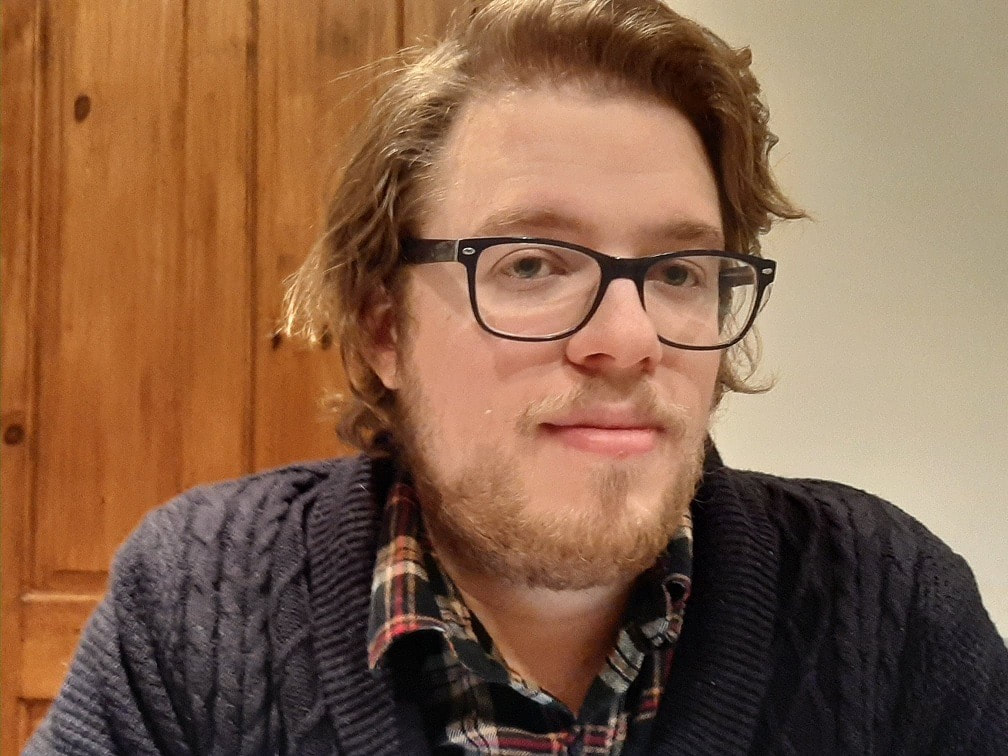Odd Voice Out
Jack Bumby Interview9/24/2020 Jack Bumby is a writer living and working in Greater Manchester. He studied Creative Writing at Edge Hill University, during which time he won the LoveSexTravelMusik competition organised by author Rodge Glass, with his short story ‘Wouldn’t It Be Nice?’. Since leaving university, he has placed second in a scriptwriting competition at Tyldesley Little Theatre and self-published a collection of short stories with fellow writers, titled ‘The Torment of Thomas Farriner’. Currently, he is an avid reviewer and spends a lot of time contributing to his blog, ‘My Creative Ramblings’. He is working on a novel and has recently begun a Master's Degree in Creative Writing. In our interview discussing his distressing yet beautiful short story 'Imago', Jack talks us through his personal writing process. The themes of illness, hallucinations and uncertainty play a huge part in the intrigue of reading ‘Imago’. How did those themes come about? These sorts of things came about from the research I did around the disease. In the story, it’s an unnamed disease but was inspired by a real condition named ‘fatal familial insomnia’ (FFI). I read ‘The Family That Couldn’t Sleep’ by D.T. Max and found FFI to be just the most terrifying illness. It has a lot of symptoms, like hallucinations and delirium. A lot of the symptoms also mirror the things most of us experience in our teenage years; sexual issues, panic attacks, paranoia, stress, emotional ups and downs. Are you more of a meticulous plotter, or a seat-of-your-pants style writer? Plotting is something that can really stress me out if I focus on it! I remember reading a quote from Stephen King – in ‘On Writing’ I think – where he said that every story is a fossil. You have an initial idea, then it’s up to you to uncover, dig, and discover as you go along. Often you, the writer, don’t know where it’s going. You just keep digging and see where it takes you. That’s an idea that stuck with me. Whilst there has certainly been a surge forward in the representation of young gay men in YA literature, your story takes the sexual awakening element in a more mature and compassionate direction. How important was it to you to effectively and realistically portray this? In terms of concerns for a young adult, I think that sex and sexuality is usually at the forefront of these worries. It’d be doing a disservice to the young people currently experiencing these feelings to not treat it with respect and compassion, and to not talk about it plainly. So I wanted that to be one of the most important parts of the story. And this element was probably the part of the piece that required the most examination and redrafting. Primarily, I wanted to focus on the intimate and emotional side of his sexual experience. It’s a very human and necessary act, in the midst of all this stress and turmoil. It’s one of the few moments of light in an otherwise dark story, so it was vital that it felt real. The relationship between Charlie and his father lies at the heart of this story as a grounding force whilst other elements are spinning out of control. What was your process in creating this bond between father and son? That idea of the relationship being a ‘grounding force’ is exactly right. Charlie is dealing with a lot in the story, so I wanted that father/son relationship to initially be one of understanding and kindness. For example, his sexuality is a non-issue between them; his father just wants him to be safe. But as the story continues, I wanted to bring in this idea of an inevitable rift between them. Despite their best intentions, there are things they can’t talk about. These are ideas society has forced on them, namely that men don’t talk about their feelings, about what they’re going through. So I wanted the relationship to have this sort of tragic side to it as well – but their relationship needed to be strong for this to hit with the full emotional weight. There are a lot of different elements going on ‘Imago’ which makes it a very rich and complex read. How did you handle the balance of the plot with so much going on in Charlie’s life? For this, redrafting came through and saved the day. I mentioned before about how I write and just let the story unfold as I go along – but this way of working makes the redrafting process all the more crucial. You have to trim and cut to get the story down to the key elements. Charlie’s illness, his burgeoning sexuality, his father. Anything outside of that had to go. K.C. Finn at Odd Voice Out was so vital to this process too. And I think it’s integral, if you’re going to have a lot of elements in a story like this, that they all mean something to the overall piece. What does a typical writing session look like for you? For me, I work best with some noise. Coffee shops are great, and there’s an excellent co-working space in Manchester called ‘Ziferblat’ that has been a godsend. Also, I know it’s considered a bit of a writing sin in some circles, but I write best to music. Some people say music influences your writing, but for me, it’s a way to keep me focused. Without wishing to spoil the story for those who haven’t read it yet, the overall tone of ‘Imago’ is much darker than that of your typical YA tale. What made you choose this very effective alternative storytelling approach? ‘Imago’ covers some heavy subjects and one of my aims from the very start was to take them all seriously. Young people are dealing with some very serious things in their own lives, and in the tumultuous world around them, and I reckon we shouldn’t avoid discussing these things. I work with the idea that young people are much more attuned to these issues than people give them credit for. But again, there was that line. It had to serve the story. The darker elements are all there for a reason. What’s next for you as a writer? Next up, I’m aiming to finish my Creative Writing MA – you always have to be studying something, I reckon! On top of that, I’ll be hopefully working my way through my first novel and submitting to as many competitions as humanly possible.
0 Comments
Leave a Reply. |


